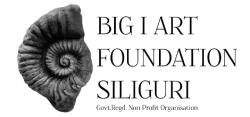PATRON ART AWARD
PATRON ART AWARD Initiated and Organized by BIG I ART FOUNDATION SILIGURI . This Govt.Regd, Non-profit Organization in Siliguri is Associated with other renowned and well-established art galleries for This event. The program has been designed as an annual event recognize excellence in visual art and discover genuine talent in India.
It aims to promote the varied richness of young artists practices. The project is looking towards a platform for artists mentored by eminent artists and Curators.
Objectives:
• To recognize young talent and reward excellence in visual arts.
• Encourage multidisciplinary interaction.
• Promote meeting and interaction of creative minds.
To recognize excellence in visual art and discover genuine talent in India, especially beyond the cities.The works for the awards will be selected by a jury which will highlight the uniqueness of vision of art and artist. This event is open to all artists, trained as well as self-taught.This is an attempt to develop a cultural entrepreneurship.
Patron Art Award
2023-24
To continue the legacy, an open call for the All India '3rd Patron Art Award 2023-2024' will be organised by 'BIG I ART FOUNDATION SILIGURI' this year as well.
Honourable Jury members are:
▪Prof Rajan Shripad Fulari Dean, School of Visual Arts, World University of Design, WUD, Delhi NCR.
▪Shri Probir Gupta,Eminent Indian Modern and Contemporary artist, New Delhi.
▪Shri Ayan Mukherjee, An Independent curator, founder, and director of A.M (Art Multi disciplines) Studio, Kolkata.
▪Shri Tusar Kanti Pradhan, curator and artist of T-93 Art Gallery, Kolkata.
▪Ghosh, Contemporary Artist, Curator and Founder and Secretary of BIG I ART FOUNDATION SILIGURI, Siliguri.
▪Shri Nilanjan Das (Winning Artist of the 1st PATRON ART AWARD 2020-2021) Howrah
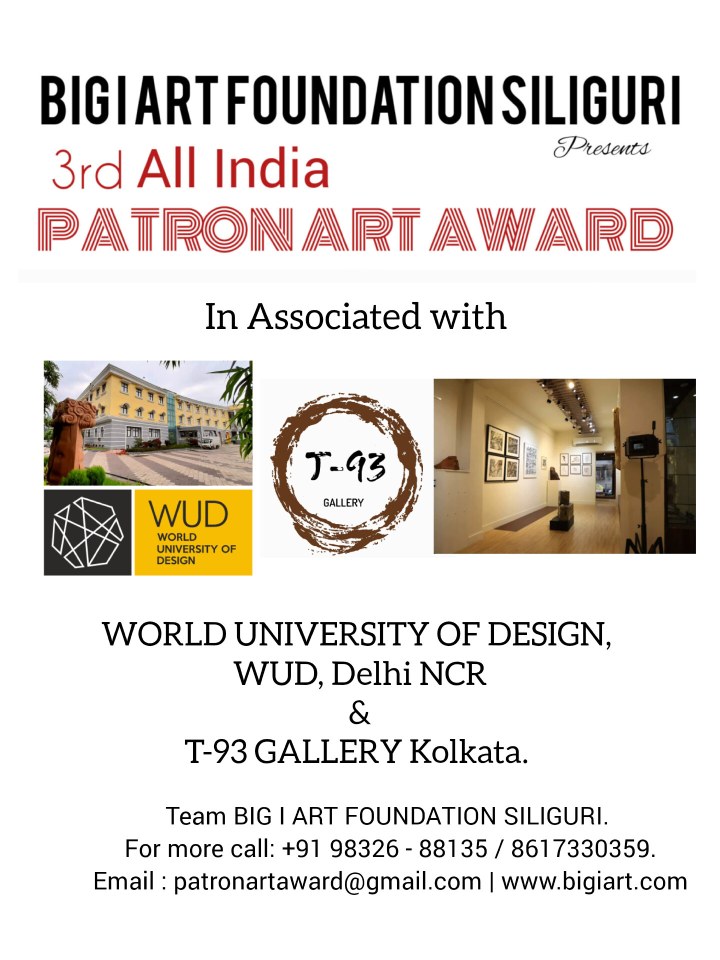

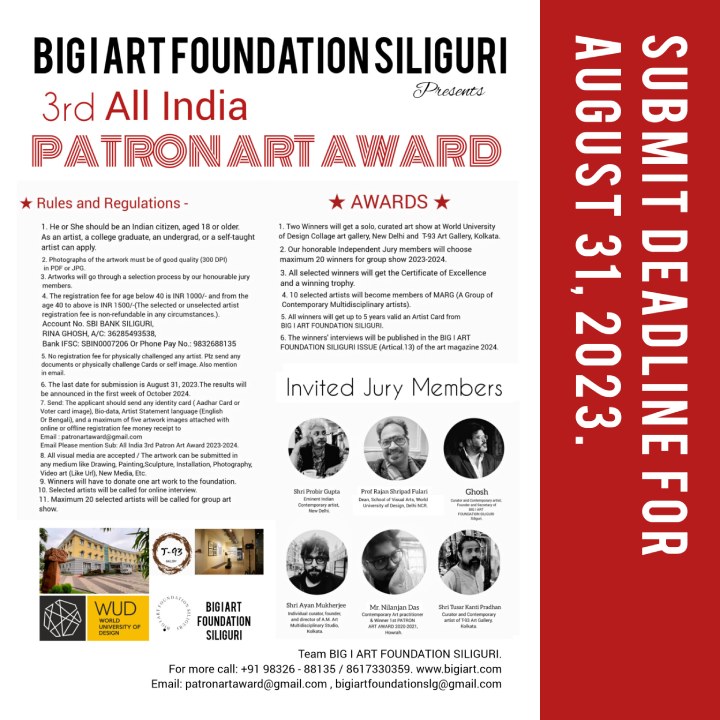
Patron Art Award
2022-23
To continue the legacy, Open call for All India 'Patron Art Award 2022-2023' will be organized by 'BIG I ART FOUNDATION SILIGURI' this year as well. We are planning to add a few more ideas to the program, especially in the field of justice and rewards.
This year we look forward to rewarding more than just one, so we can provide more platforms for the Visual artists.
JURY MEMBERS
.jpeg)
Sri Chandra Bhattacharjee
Eminent Artist,Kolkata
.jpeg)
Sri Rajib Bhattacharjee
Founder & Curator, Studio next Kolkata
.jpeg)
Sri Ayan Mukherjee
Founder & Curator, A.M (Art Multi disciplines),Kolkata
.jpeg)
Sri Dipayaan Ghosh
Founder & Secretary BIG I ART FOUNDAION SILIGURI, Siliguri
.jpeg)
Mrs. Moumita Sarkar
Curator, Nippon Contemporary Art Gallery, Mumbai
.jpeg)
Mr. SRINJOY GANGOPADHYAY
Contemporary Pop Artist from the US, Atlanta
AWARDS
Winners selected by our Honorable Independent Jury members will receive as a prize (each winner) a one-man curated show /Artist Residency. These individual solo exhibitions will be organized by our associates' jury members and curators on behalf of the affiliates. The curators in charge of the affiliates with the winning artists will decide among themselves through clear discussion about the time, date within 2022-2023 April, etc of the exhibition.
Patron Art Award 2022-23
Winners
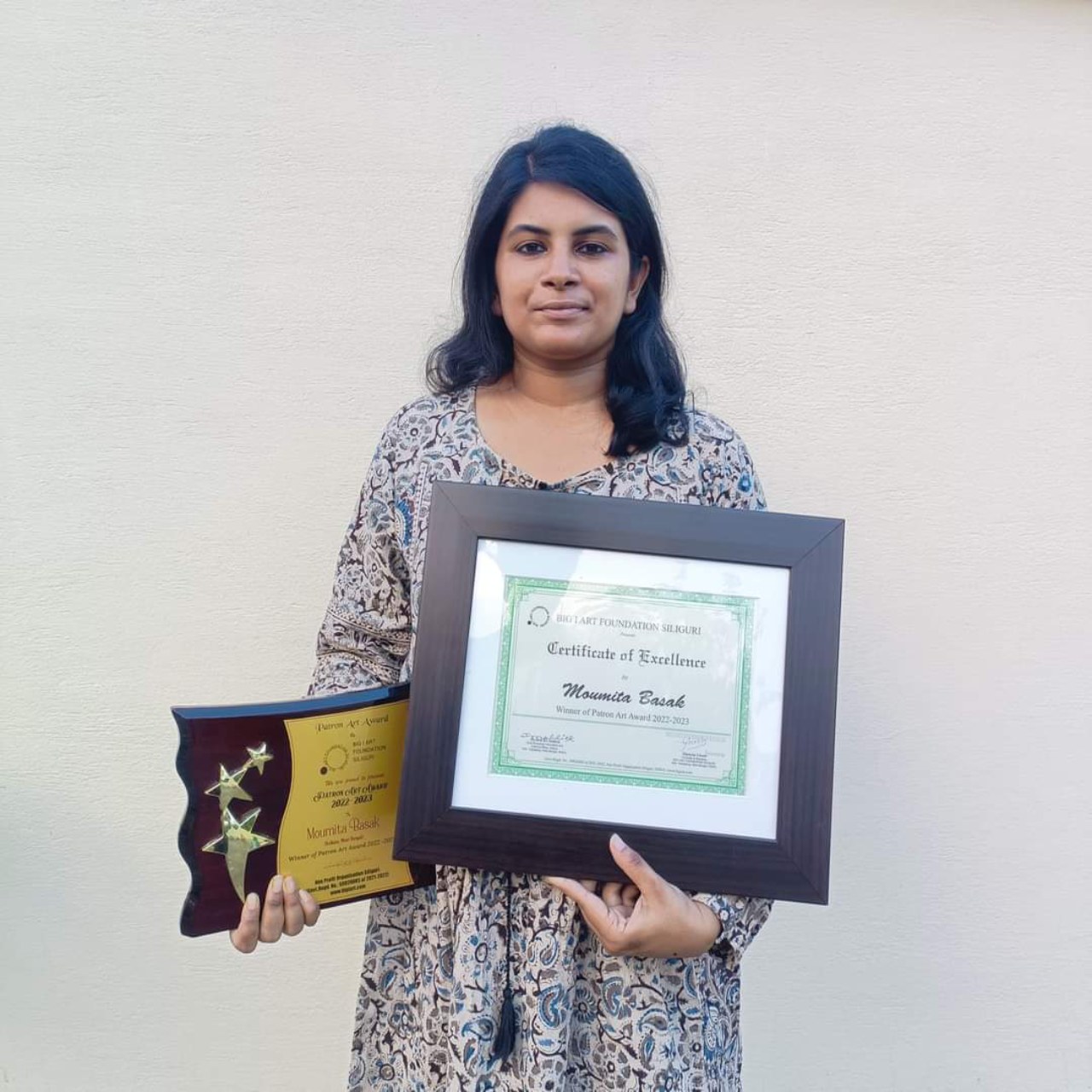
Moumita Basak
Kolkata, West Bengal
.jpeg)
Sk Avik
South 24 Parganas, Kolkata, West Bengal
.jpeg)
Suresh Kumar Singha
Katuwa, Burdwan, West Bengal
Patron Art Award 2020-21
'PATRON ART AWARD', (Rising Bengal) 2020-2021, by BIG I ART FOUNDATION SILIGURI & A.M ( Art Multi-Disciplines) KOLKATA. We have invited distinguished painters from bengal as our honorable jury Sri Jogen Choudhury, Sri Atin Basak, Sri Amitabh Sengupta, Sri Chhatrapati Dutta, Sri Abir Karmakar, Smt Sukanya Das, Sri Sudipta Roy, Sri Manas Acharya, Sri Ayan Mukherjee and Sri Dipayaan Ghhosh throughout this event.
WINNER
'PATRON ART AWARD' (Rising Bengal) 2020- 2021, Winner Mr Niranjan Das from Howrah, West Bengal.
NILANJAN DAS
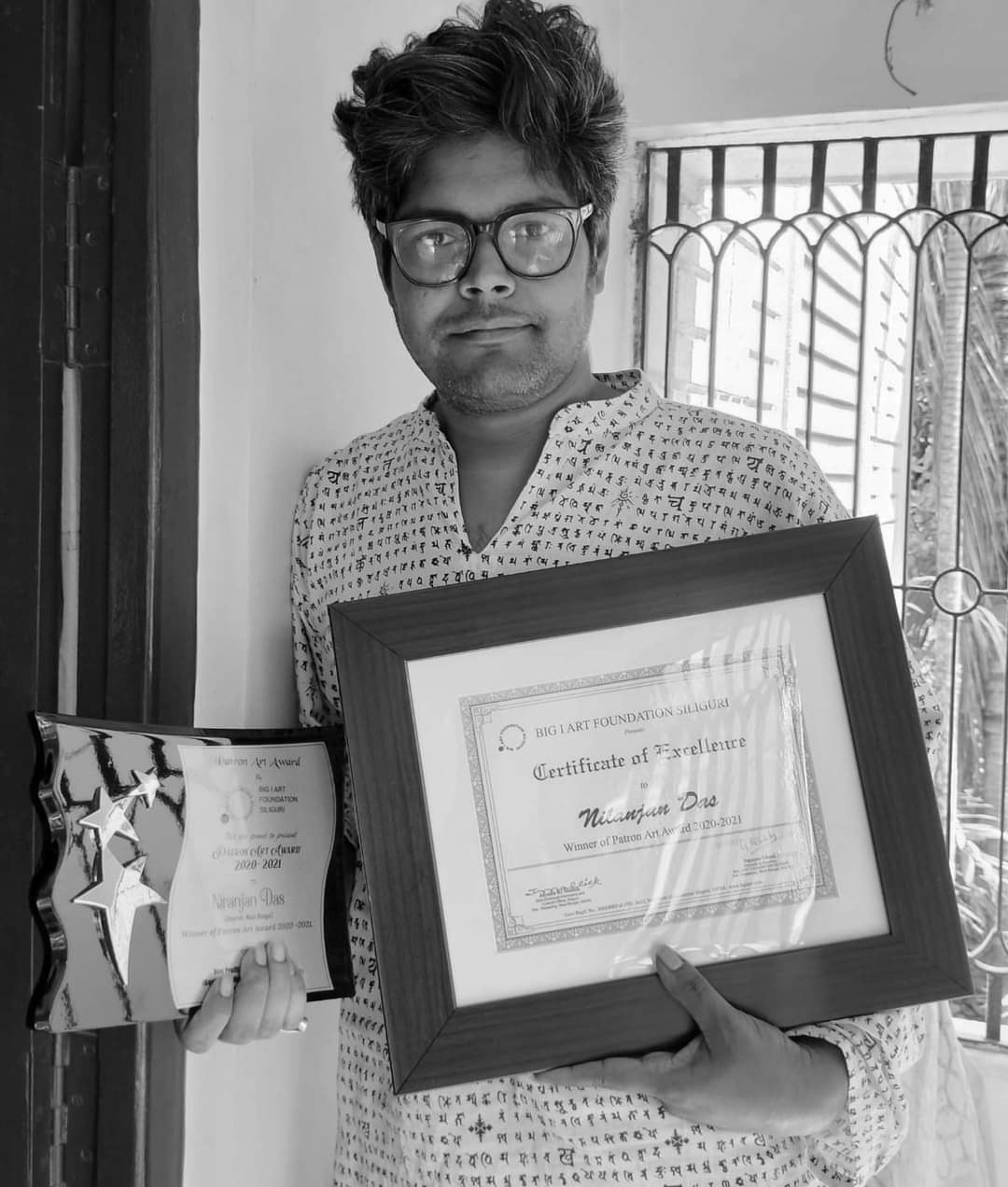
.jpg)
.jpg)
.jpg)
ACADEMIC QUALIFICATION
M.F.A Graphics / Printmaking. Rabindra Bharati University 2010 - 2012 B.F.A (Hons) Graphics / Printmaking. Rabindra Bharati University 2007 - 2010.
AWARDS AND GRANTS
• Selected in New Prints 2020/ summer at International Print Centre New York curated by Chitra Ganesh. Awarded with the Sponsered coursework pograme by IPCNY.
• Artist in residency in Pulp Society, Delhi (Postponed for COVID-19)
• Khoj grants for social art practise 2019.
• Next-Step Artist in residency program, by 1 Shanthiroad studio and gallery, Bangalore, 2018 supported by the Sher-Gil Sundaram Arts Foundation.
• Megalo Artist in Residency Award, Canberra, Australia, 2018.
• National Award in 29th National Exhibition of Contemporary Art organized by SCZCC, Nagpur (Ministry of culture, Government of India) 2016.
• Best Printmaking award in Birla academy of art and culture, 2014.
• Certificate of merit for printmaking in the Annual Exhibition of R.B.U in the year 2011.
PROJECT & PARTICIPATION
Participated in Stereoscopic Narratives Supported by India Foundation for Arts and Goethe- Institut-Max Mueller Bhavan, Kolkata, 2018.
Conducted Art & Science Workshop at Jagadis Bose National Science Talent Search, Kolkata, 2018.
Participated in the small-format print exhibition in The Zs’ Precinct Gallery, Kolkata, 2018.
Participated in Cima award show in 2017.
‘Shades of Grey’ a solo exhibition, supported by Ministry of Culture, Government of India & Studio21 Gallery at Kolkata, 2016.
Participated in Emami Chisel Art Fair, Kolkata, 2016.
Participated in a community-based art exhibition at Mumbai Art Room supported by Tata Trust in the year 2016.
Participated in ‘Chitpur local past, present, future’ at Studio21, 2016.
Participated in the Annual exhibition of Emami Chisel art gallery, Kolkata 2015, 2016.
Participated in ‘Sikriti’ quartered by Birla academy of art and culture, Kolkata, 2014.
Participated in Multiple encounters second edition, national printmaking festivals at New Delhi, 2013.
ARTIST STATEMENT OF NILANJAN DAS
‘In search for a comfort zone’ is an ongoing project that focused on gender interaction and intimacy in public domain and I am exploring this idea both through public art projects and studio practice. Therefore I examine public space and various components it composed of, such as social or legal rules, value systems, norms, functionalities, physical structure, even history of a place. Values, norms or rules, Henry Lefebvre, a French Marxist philosopher and sociologist, considered as one of the crucial components of the complex structure called social space. Who determine values and norms or set up the rules? Lefebvre held capitalism accountable for governing the social space, even everyday life by exploiting or bringing in value systems. Indian reality is far remover and complex from the west. Here it is capitalist forces in accordance with traditions, customs, norms of inequality, political institutions, state and religion, determine the value system that affects the formation of social space. Public space is a place to examine those values and social/legal norms that shape and control everyday public life. Public display of affection (PDA) is a political yet heavily contested idea in a society like in India. Most of the Indian cities do not have places for lovers, Couples. Those who do not have a place to go; often use Public Park, garden etc. to spend some intimate moments. PDA in India is just not a performative act to challenge the taboo and stricture of a conservative society; it also comes from the basic desire and unavailability of a place to go. I attended a residency program at 1shanthiroad studio and gallery, Bangalore. Which granted me the opportunity to observe how young people in the city use a public park called Cabbon Park as a place to make art and love. I collected imprints from the marks that couples who visit the place often purposefully or spontaneously leave on the tree trunks, rocks, concrete chairs in the park.These scribbles revel, individuals, associations or memories of certain public spaces, which may not just be a geographical location for them. As they search for their comfort zone there is always a temporary transformation or shift from public to private.The method I used to collect the imprints from the Cubbon park, Bangalore is mainly direct tracing from the bamboo trunks. But imprints on other surfaces such as concrete can’t be traced directly, hence I photographed them and later on transferred these photographs to the cast/ found concerts through screen printing and polymer photo etching. Screen printing is one of the crucial medium in my practice as it gives freedom to print on any plane surface and can be used as a brilliant tool for public discourse. While printing photographic images in halftone is also possible.I started rediscovering these public spaces and closely observed the spatial structure, benches, architectures and collected scribbles, architectural design etc and try to collaborate with the couples and local stakeholders and further, reimagine these spaces both through studio practice and public art projects. Each of these spaces has specific typology that permits and shapes a typology of behaviour and space is in turn shaped by these behaviours and allow or disallow specific gendered interactions. My recent projects at North Kolkata ghats (river bank) with collaboration to Khoj is the outcome of the above statement, where I tried to initiate a collaborative conversation to develop rules of occupying the ghats for both couples who visit the ghat to spend some intimate moments and the people who live in the settlements along the river. While my present project is also focused on the reimaging of Public Spaces. With this growing pandemic when social distancing or better to mention it as Physical distancing is the only key, the question comes forth how these spaces claim to be redundant in future. The present scenario edifying new codes of social behavior, legitimacy and our relationship towards the public sphere, a paradigm shift that leads us to a new way of physical behavior and movement in public space. In this context, I want to look at the public spaces, such as public parks which host pockets and corners of sub-places for couples looking for privacy, as - how it was in terms of codes of behavior related to spatial structure, further reimagine and redesign these existing structure “which are giving way to a radical restructuring of how bodies exist in public space and can access intimacy.”
